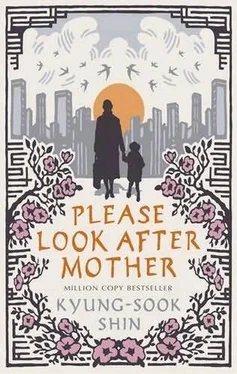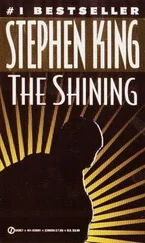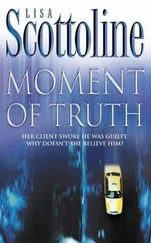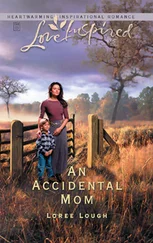You let Hong Tae-hee in. Supposed to read her a book? To your wife? You have never heard your wife mention Hope House or Hong Tae-hee. Hong Tae-hee calls out for your wife as soon as she sets foot inside the gate, as if she can’t believe that your wife is really missing. When there’s no response, Tae-hee’s expression grows cautious. “Did she leave home?”
“No, she’s missing.”
“What?”
“She went missing in Seoul.”
“Really?” Tae-hee’s eyes grow wide. She tells you that, for more than ten years, your wife came to Hope House and bathed the children and did the laundry and tended the garden in the yard.
Your wife?
Tae-hee says that your wife is highly respected and that she donates 450,000 won a month to Hope House. She explains that your wife has always donated this amount.
Four hundred fifty thousand a month?
Every month, your children in Seoul would pool together six hundred thousand won and send it to your wife. They seemed to think that two people could survive on that amount in the countryside. It wasn’t a small sum. At first, your wife shared this money with you, but at some point she said she would take the entire amount. You wondered where this came from all of a sudden, but your wife asked you not to question how she was using the money. She said she had the right to use the money, since she was the one who had raised all the children. It seemed that she had thought about it for a long time. Otherwise, she wouldn’t have said, “I feel that I have the right to use the money.” That wasn’t the kind of thing your wife would say. It sounded like something from a television drama. Your wife would have practiced that sentence by herself for a few days, into the air.
One Parents’ Day in May, years ago, none of the children called. Your wife went to the stationery store in town and bought two carnation buds, each tied to a ribbon that said “Thank you for giving me life and raising me.” She found you standing by the new road and urged you to come home. “What if someone sees us?” You followed her home. She persuaded you to come inside and lock the door, then pinned a carnation to the front of your jacket. “What would people say if we went around without a flower pinned to our clothes, when everyone knows how many children we have? That’s why I bought these.” Your wife fastened a flower on her clothes, too. The flower kept drooping, so she repinned it twice. You took off the flower as soon as you left the house again, but your wife went around the whole day with the flower on her chest.
The next day, she took to her bed, ill. She tossed and turned for a few nights, then sat up abruptly and asked you to transfer three majigi of land to her name. You asked her why, and she said it was because her life was pointless. She felt useless now that all the children had gone their separate ways. When you explained that all of your land is her land, too, and that if only three majigi were transferred to Park So-nyo she would lose out, because this would make it clear that the rest was yours, she looked disappointed and said, “I guess that’s true.”
But she was firm when she announced that she wanted all of the children’s money. You didn’t feel like going against her when she was like that; you thought you would get into a big fight if you did. You agreed on one condition: she could take all the money, but she couldn’t come to you for more. Your wife said that would be fine. It didn’t seem she was buying clothes or doing anything in particular with the money, but when you took a peek at the account books, 450,000 won was taken out of the bank account on the same day every month, in one lump sum. If the money came late, she called Chi-hon, who was in charge of collecting it from her siblings and sending it, to remind her to send the money. This, too, was unlike your wife. You didn’t ask her what she was doing with it, because you promised you wouldn’t, but you thought she was taking the 450,000 won every month to put in a savings account, to create purpose in her life again. You once searched for a savings-account passbook, but you never found one. If Hong Tae-hee is right, your wife had been donating 450,000 won a month to Hope House in Namsan-dong. You feel bludgeoned by your wife.
Hong Tae-hee tells you that it’s really the kids who are waiting for your wife, more than she is. She tells you about a boy named Kyun, says that your wife practically became the boy’s mother, that he was especially saddened that your wife had suddenly stopped coming to the orphanage. She says he was abandoned at the orphanage before he was six months old without even a name, but that your wife had named him Kyun.
“Did you say Kyun?”
“Yes, Kyun.”
She says that Kyun is going to start middle school next year; your wife has promised to buy him a book bag and a uniform when he does. Kyun. A chill comes over your heart. You listen quietly to Hong Tae-hee’s story. You can’t believe you didn’t know that your wife has been going to the orphanage for more than a decade. You wonder whether your missing wife could be the same woman Hong Tae-hee is talking about. When did she go to Hope House? Why didn’t she say anything to you? You gaze at your wife’s picture in Hong Tae-hee’s newspaper ad and go into your room. From a photo album buried deep in a drawer, you peel off a picture of your wife. Your daughter and wife are standing at the pier on a beach, clutching their clothes, which are blowing astray in the wind. You push the picture toward Tae-hee. “Is this the person you’re talking about?”
“Oh, it’s Auntie!” Tae-hee calls out happily, as if your wife is standing in front of her. Your wife, her brow furrowed against the sun, is looking at you.
“You said you were supposed to read to her? What do you mean?”
“She did all the difficult work at Hope House. She particularly enjoyed bathing the children. She was so efficient that, after she came to visit, the whole orphanage would be sparkling clean. When I asked her what I could do to thank her, she said there was nothing, but one day she brought in a book and asked me to read it to her for an hour each time. She said it was a book she liked but that she couldn’t read anymore, because of her bad eyesight.”
You are quiet.
“It’s this book.”
You stare at the book Hong Tae-hee takes out of her bag. Your daughter’s book.
“The author is from this area. I heard she went to elementary and middle school here. I think that’s why Auntie likes this author. The last book I read her was by this author, too.”
You take your daughter’s book, To Complete Love . So your wife had wanted to read her daughter’s novel. Your wife had never told you as much. You had never even thought of reading your wife your daughter’s books. Does anyone else in the family know that your wife can’t read? You remember how your wife looked hurt, as if you had insulted her, the day you found out that she didn’t know how to read. Your wife believed that you did everything you did because you looked down on her, because of her illiteracy-leaving home when you were younger, yelling at her at times, rudely replying to her questions, “Why do you want to know?” That wasn’t why you did those things, but the more you denied it, the more she believed it to be true. You wonder if you did look down on her, unconsciously, as she insisted you did. You had no idea that a stranger was reading your daughter’s novel to your wife. How hard your wife must have worked to hide from this young woman the fact that she didn’t know how to read. Your wife, wanting so badly to read your daughter’s novel, couldn’t tell this young woman that the author was her daughter, but blamed her bad eyes and asked her to read it out loud. Your eyes sting. How was your wife able to restrain herself from bragging about her daughter to this young woman?
Читать дальше











